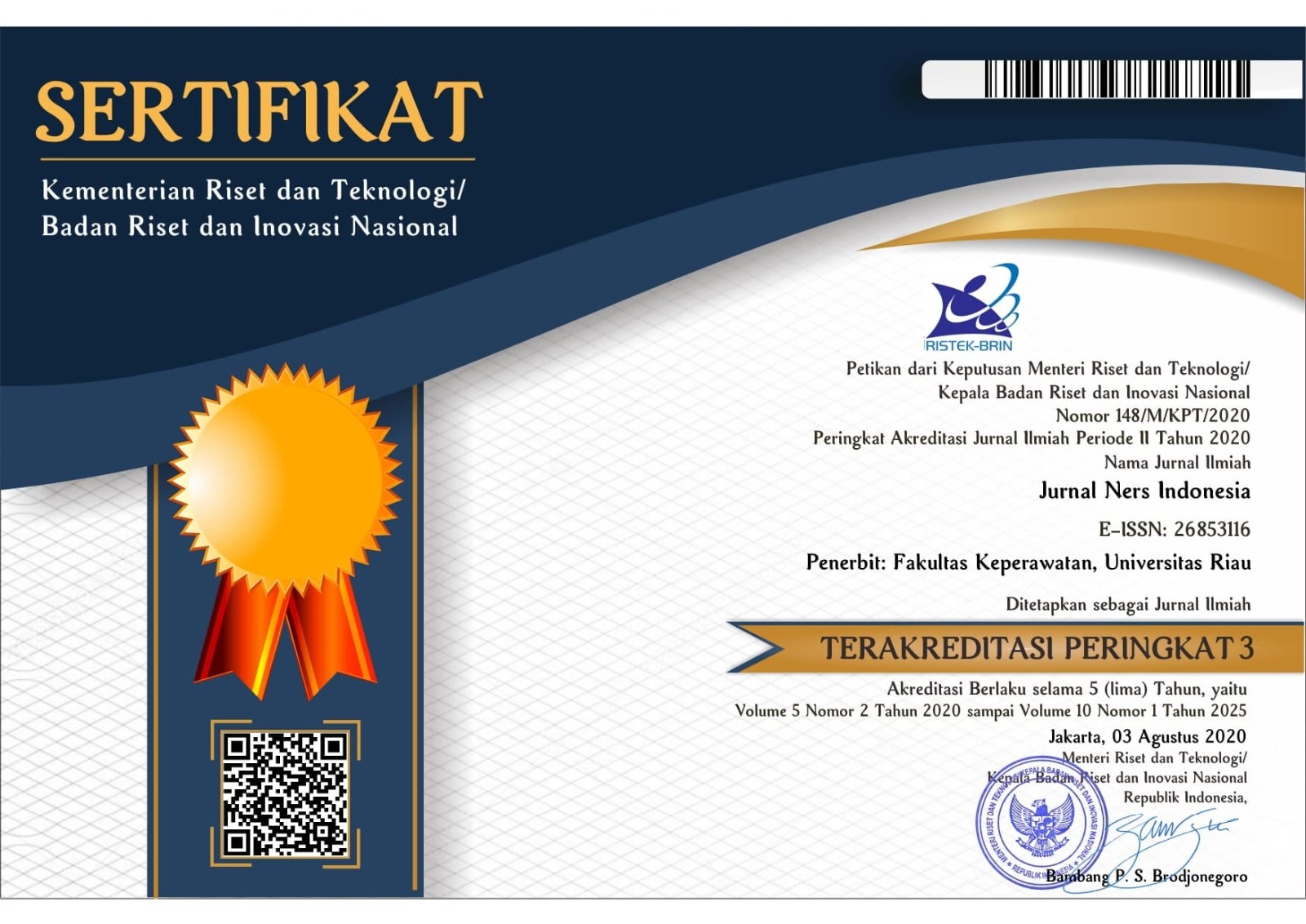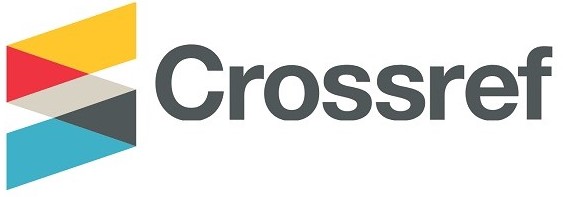PENERAPAN MENDENGARKAN AL-QUR’AN SURAT AL WAQI’AH DAN TERJEMAHANNYA UNTUK MENURUNKAN TINGKAT KECEMASAN PADA PASIEN ELEKTIF BEDAH DIGESTIF
DOI:
https://doi.org/10.31258/jni.11.2.181-191Keywords:
Qur’an, waqi’ah, cemas, bedah, digestifAbstract
Kecemasan dapat menjadi komplikasi sebelum pembedahan dan dapat memengaruhi pemulihan pasca operasi sehingga menambah lamanya hari rawatan pasien di rumah sakit. Kecemasan sebelum operasi, mengubah status metabolisme pasien dan memengaruhi respon stres perioperatif. Tujuan evidence based nursing (EBN) untuk mengidentifikasi efektifitas mendengarkan Al-Qur’an surat Al Waqi’ah dan terjemahannya dalam mengurangi kecemasan pada pasien bedah digestif. EBN ini menggunakan quasi eksperimen yang melibatkan 8 partisipan di ruang perawatan bedah digestif dengan penilaian pre dan post intervensi, serta 30 menit sebelum pasien ke kamar operasi. Hasil analisis uji independent t-test, bahwa ada perbedaan signifikan rerata tingkat kecemasan berdasarkan STAI dengan p=0,03 (CI 95%). Kesimpulan: Mendengarkan Al-Qur’an surat Al Waqi’ah dan terjemahannya dapat dijadikan intervensi keperawatan manajemen menurunkan tingkat kecemasan pada pasien sebelum menjalani bedah digestif
References
Ahmadi, A., & Supriyono, W. (2013). Psikologi belajar. Jakarta: Rineka Cipta
Ai, A. L., Wink, P., & Shearer, M. (2012). Fatigue of survivors following cardiac surgery: positive influences of preoperative prayer coping. British Journal of Health Psychology, 17, 724-42. doi:10.1111/j.2044-8287.2012.02068.x
Ajorpaz, M. N., Aghajani, M., & Shahshahani, M. (2011). The effects of music and Holy Quran on patient’s anxiety and vital signs before abdominal surgery. Evidence Based Care Journal, 1, 63‑76. 10.22038/EBCJ.2011.3765
Alhouseini, A. M. R. A., Shaikhli, I. F. A., Rahman, A.W. B. A., Alarabi, K., & Dzulkifli, A. (2014). Stress assessment while listening to quran recitation. International Conference on Computer Assisted System in Health.
doi: 10.1109/CASH.2014.14
Allred, K. D., Byers, J. F., & Sole, M. L. (2010). The effect of music on postoperative pain and anxiety. Pain Management Nursing, 11(1),
-25. doi:10.1016/j.pmn.2008.12.002
Bagheri, P., Mohammadi, M. R., & Shafiei, N. (2015). Thematic analysis of Persian documents in the field of quran study and medicine in National Scientific-Research Journals from 1992 to 2013 “An opportunity for evidence based decision making.” Journal of Religion and Health, 56(3), 755–775.
doi:10.1007/s10943-015-0078-6
Bakar, S. A. B. A. (2014). Effect of holy quran listening on physiological stress response among muslim patients in intensive care unit. E-proceedings of the Conference on Management and Muamalah (CoMM 2014), 26-27 May 2014. https://www.kuis.edu.my
Bauer, B. A., Cutshall, S. A., Anderson, P. G., Prinsen, S. K., Wentworth, L. J., Olney, T. J., & Bauer, B. A. (2011). Effect of the combination of music and nature sounds on pain and anxiety in cardiac surgical patients: a randomized study. Altern Ther Health Med, 17(4), 16-23. https://www.ncbi.nlm.nih.gov/pubmed/22314630
Cuesta, M. A & Bonjer, H. J. (2014). Treatment of postoperative complications after digestive surgery. doi 10.1007/978-1-4471-4354-3.
Comeaux, T., & Comeaux, T. (2013). The effect of complementary music therapy on the patient's postoperative state anxiety, pain control, and environmental noise satisfaction. Medsurg nursing, 22(5), 313-8. https://www.ncbi.nlm.nih.gov/pubmed/24358573
DeLaume, S C & Ladner, P K (2011). Fundamental of Nursing. Standart & Practice. (4th Ed). Delmar Chengenge Learning
Dharma, K. K. (2017). Metodologi penelitian keperawatan: Panduan melaksanakan dan menerapkan hasil penelitian. Jakarta: Trans Info Media.
Draper, P. (2012). An integrative review of spiritual assessment: implications for nursing management. J Nurs Manag, 20(8), 970-980. doi: 10.1111/jonm.12005
Dunst, C. J., Hamby, D. W., & Trivette, C. M. (2004). Guidelines for Calculating Effect Sizes for Practice-Based Research Syntheses. Centerscope. Evidence-based approaches to early childhood development, 3, 1. https://pdfs.semanticscholar.org
Ebrahimi, E. (2011). Spiritual health and psychosis in the light of Quran. Arak Medical University Journal, 13(5), 1–9. http://jams.arakmu.ac.ir/article-1-916-en.pdf
Fauzan, N & Abidin, N. A. (2017). The effects of neurotherapy (NFT) Using ayatul kursi as stimulus on memory performance, Vol. 2. Journal of Islamic, Social, Economics and Development. Issue: 4, 22-31. www.jised.com
Ghiasi, A., & Keramat, A. (2019). The Effect of listening to holy Quran recitation on anxiety: A systematic review. Iranian Journal of Nursing and Midwifery Research. 23, 411-20. doi: 10.4103/ijnmr.IJNMR_173_17
Goniawan, A., Suhandi., & Machdi, Z. (2018). Multi perspektif surat Al Waqi’ah. Pustaka Ilmu Sunni Salafiyah. KTB Versi 4.0: Jakarta.
Hidayat, A. A. A. (2009). Pengantar kebutuhan dasar manusia, aplikasi konsep dan proses keperawatan. Jakarta: Salemba Medika
Ibrahim, S. (2010). Telaah The Holy Qur,an Karya Abdullah Yusuf Ali. Jurnal Hunafa, 7, 1-24. https://jurnalhunafa.org
Ignatavicius., & Workman. (2016). Clinical companion for medical-surgical nursing: Patient-centered collaborative care. Eighth Edition. St. Louis, Missouri. Elsevier.
Julianto, V., & Etsem, M. B. (2011). The effect of reciting holy qur’an toward short-term memory ability analysed trought the changing brain wave. Jurnal Psikologi, 38, 17 – 29. https://media.neliti.com/media/publications/128278-ID-none.pdf
Kemenkes RI. (2013). Standar pelayanan minimal rumah sakit. Jakarta: Kemenkes
Ko Y. L., & Lin, P. C. (2012). The effect of using a relaxation tape on pulse, respiration, blood pressure and anxiety levels of surgical patients. Journal of Clinical Nursing, 21(5-6), 689-97. doi: 10.1111/j.1365-2702.2011.03818.x.
Liu, Y., & Petrini, M. A. (2015). Effects of music therapy on pain, anxiety, and vital signs in patients after thoracic surgery. Complementary therapies in medicine, 23(5), 714-8. doi:10.1016/j.ctim.2015.08.002
Litwack, K. (2009). Clinical coach for effective perioperative nursing care. Philadelphia: F. A. Davis Company
Merchant., K. (2012). How men and women differ: Gender differences in communication styles, influence tactics, and leadership styles. CMC Senior Theses. https://scholarship.claremont.edu/cmc_theses/513
Miller, K. R., Wischmeyer, P. E., Taylor, B., & McClave, S. A. (2013). An Evidence-Based approach to perioperative nutrition support in the elective surgery patient. Journal of Parenteral and Enteral Nutrition, 37, 39S-50S. doi: 10.1177/0148607113493928
Mirsane, S. A., Kheirkhah, D., Shafagh, S., Ajorpaz, N. M., & Aminpour, J. (2016). The effect of listening to vaghe’a surah and its translation on the state and trait anxiety before general surgeries: a Randomized Controlled Clinical Trial. Health, Spirituality and Medical Ethics, 3(3), 12-17. http://jhsme.muq.ac.ir/article-1-117-en.pdf
Mustapha, M., Rani, N. S. A., Reza, M. F., Daud, W. N. W., & Ghani, M. A. A. (2016). Neurotechnological Advances in Exploring Melodic Recitation of the Noble Qur’an: Uncovering the Neural Circuitry in the Human Brain. Springer Science and Business Media Singapore 2016. doi: 10.1007/978-981-287-778-9_15
Ottaviani, S., Jean-Luc, B., Thomas, B., & Pascal, R. (2012). Effect of music on anxiety and pain during joint lavage for knee osteoarthritis. Clinical Rheumatology, 31 (3), 531-534. doi: 10.1007/s10067-011-1925-9
Rasmun. (2004). Stres, koping dan adaptasi: Teori dan pohon masalah keperawatan. Jakarta: Sagung Seto.
Rose, J., Weiser, T. G., Hider, P., Wilson, L., Gruen, R. L., & Bickler, S. W (2015). Estimated need for surgery worlwide based on pravalence of diseases: A modelling strategy for the WHO global health estimate. Lancet Glob Health, 3(52), 513-20. www.thelancet.com/lancetgh
Rothrock, J. C. (2011). Alexander’s care of the patient in surgery. 14th ed. St. Louis: Mosby, Inc.
Salarvand, S., & Pournia, Y. (2013). Perception of Medical University Members from Nutritional Health in the Quran. Iranian Red Crescent Medical Journal. doi:10.5812/ircmj.10846
Smeltzer S. C., Bare, B. G., Hinkle, J. L., & Cheever, K. H. (2010). Brunner & Suddarth’s. Textbook of Medical-Surgical Nursing. Twelfth Edition. Lippincott Williams & Wilkins
Supriadi, D., Nurachmah, E., & Gayatri, D. (2013). Pengaruh stimulasi murottal Al-Qur`an terhadap tingkat kecemasan pasien Sindrom Koroner Akut (SKA). Jakarta. FIKUI
Steiner, C. A., Karaca, Z., Moore, B. J., Imshaug, M. C & Pickens, G. (2017). Surgeries in hospital-based ambulatory surgery and hospital inpatient settings, 2014. HCUP Statistical Brief #223. www.hcup-us.ahrq.gov/reports/statbriefs/sb223-Ambulatory-Inpatient-Surgeries-2014.pdf.
Vardanjani, M. M., Alavi, N. M., Razavi, N. S., Aghajani, M., Fini, E. A., & Vaghefi, S. M. (2013). Randomized-controlled trial examining the effects of reflexology on anxiety of patients undergoing coronary angiography. Nurs Midwifery Stud, 2(3), 3-9.
Zulkurnaini, N. A., Kadir, R. S. S. A., Murat, Z., & Isa, R. M. (2012). The comparison between listening to Al-Quran and listening to classical music on the brainwave signal for the alpha band. Third International Conference on Intelligent Systems Modelling and Simulation. doi: 10.1109/ISMS.2012.60











